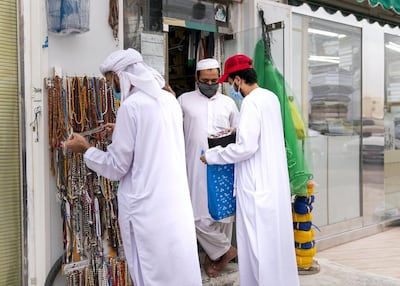Performing Eid prayers at mosques is a ritual long-etched in the minds of millions of Muslims around the world.
But with the onset of coronavirus, and the closure of all places of worship in the UAE, followers of Islam are having to adapt to a new reality.
This year, those wanting to perform Eid Al Fitr prayers will have to do so from the safety of their homes.
Other traditions, too, have become a challenge. Large gatherings of family and friends for meals, for example, are no longer possible.
“Going to Musalla Al Eid to perform Eid prayers is a tradition we all grow up doing and it’s heartbreaking to let go of it now,” said Jasim Al Shahhi, 46, a father-of-six living in Ras Al Khaimah.
“Meeting up with friends and other family members after the prayers and greeting each other for the beginning of Eid while the children run around wearing their new clothes is an essential part of Eid.
“The children will definitely miss visiting their grandparents and getting together with their cousins and nieces this year.
“And we as grown-ups will also miss the Eid gatherings with our brothers and sisters and the rest of the family.
“But we respect our leadership’s decisions to protect us from the virus.”
This week, Sheikh Abdul Rahman Al Shamsi, spokesman for the UAE’s General Authority of Islamic Affairs and Endowments, urged all Muslim worshippers to celebrate Eid at home.
Highlighting the unprecedented circumstances created by Covid-19, he stressed the need for families to focus on keeping themselves and others safe.
Eidiyah, the tradition of giving money to family members during Eid, is also prohibited this year to avoid infections spreading via banknotes and coins.
“This year is exceptional and Eid prayers will be performed at home," said Sheikh Al Shamsi.
“Mosques will be closed and the takbeer will be broadcast 10 minutes before the Eid prayer.
“After the takbeer, prayers should be performed at home. Celebrate with family members and keep loved-ones safe.”
Marowa Al Shahhi, 39, the wife of Mr Al Shahhi, agreed that this year’s Eid was going to feel very different, especially for her children.
But she acknowledged it was important to recognise the changes were only temporary and that fun family time could still be had from home.
“We will put on our new Eid outfits, perform the prayers all together at home, eat breakfast and then exchange Eid gifts instead of eidiyah,” she said.
“We are also planning to play some board games and make a barbecue dinner in the garden after sunset.
“It is going to be different for all of us, and it is hard to let go of traditions that we grew up doing, but this is a temporary situation.
“We will keep looking for new ideas to entertain the children and make them celebrate Eid in a new way that guarantees everyone's safety.”
Emirati Mohammed Ibraheem, 39, said he had almost never missed an Eid prayer at a mosque since he was a child.
The customer care manager from Dubai said he had been looking forward to introducing his son, 6, to the tradition.
“When I was a child, I used to go with my father to the mosque to perform either Friday or Eid prayers,” he said.
“For us men, we only get to feel its Eid only after we have performed the prayers and repeated the takbeer – saying Allahu akbar – after the imam.
“Without the prayer in the mosque and without repeating the takbeer, something will be missing because the prayer serves many goals, one of which is bonding people.
“I was planning to take my son to perform Eid prayer in the mosque just like my father, may his soul rest in peace, had done with me.
“But the health and safety of the people is now a priority and we have to follow the instructions of our government. Let's help our government in this fight against the disease."




















